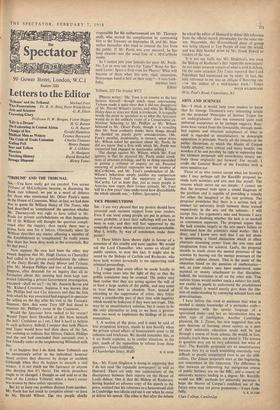Letters to the Editor
`Tribune' and the Tribunal Michael Foot Vice Prosecutions Dr. R. D. Reid, Peter Wildeblood Arts and Sciences G. R. Elton Crowning Glory
Professor D. W. Brogan, Victor Magee
`Life is a Dream' H. G. Button De-Federating in Central Africa G. H. Baxter Change of Sex Gerald Hamilton Medical Men as Writers Terence Heywood The Crisis of Trade Unionism Charles Timaeus Gallup Poll Henry Durant Sere and Yellow W. J. Gibbins Howlers N. Hodgson Teaching History David Henschel Sewage Disposal Henry Tones
TRIBUNE' AND THE TRIBUNAL
Sta,—You have really got me puzzled. You accuse Tribune of McCarthyism because, in discussing the Bank rate tribunal, we put in a word of defence for those who mentioned Mr. Oliver Poole's name in the House of Commons. What, in fact, we had done Was to quote Sir William Haley of The Times, who had described as 'complicated' the question whether Mr. Thorneycroft was right to have called in Mr. Poole for private confabulations on that September 18. If Sir William still thought the question compli- cated after the inquiry, then surely there was a prima facie case for it before. (Normally when Sir William describes any matter affecting a member of the Establishment as 'complicated,' he really means that there has been dirty work at the crossroads. But let that pass.) Now suppose the case had been the other way round. Suppose that Mr. Hugh Dalton as Chancellor had called in for private confabulations the editors of the Daily Herald, the Daily Mirror and Tribune, plus Mr. Morgan Phillips and two of his assistants. Suppose, after demands for an inquiry that all in- formation about this meeting had been kept con- cealed following a private Government investigation, executed—shall we say?—by Mr. Aneurin Bevan and Mr. Richard Crossman. Suppose it was known that Mr. Phillips had vast City interests and that the firm with which he was associated had engaged in spectacu- lar selling on the day after his visit to the Treasury. Suppose, then, that some Tory MP had dared to mention Mr. Phillips's name in the Commons.
Would the Spectator have rushed to his rescue? Would Taper have blenched at this blow beneath the belt? Credulous as I am, I find it hard to believe in such gallantry. Indeed, I suspect that both Pharos and Taper would have had their share of the fun, not omitting to indicate that Messrs, Dalton, Phillips and the rest had concluded their carousals over a few friendly tanks at the neighbouring Whitehall milk bar.
It so happens that I do think these Tribunals can be monstrously unfair to the individual, however many corpses they discover by design or accident (although when they do happen to unearth a real stinker, it is not much use the Spectator or anyone else denying that it's there). The whole procedure ought to be changed. I thought so and said so at the time of the Lynskey Tribunal, when a man's career was broken by these unfair operations.
But let us keep one problem distinct from another. Mr. Poole has not much to complain about—at least to Mr. Harold Wilson. The two people chiefly responsible for his embarrassment are Mr. Thorney- croft, who started the complication by summoning him to the Treasury on September 18, and Mr. Mac- millan thereafter who tried to conceal the fact from the public. If Mr. Poole was ever smeared, he has been cleared—not the usual fate of a McCarthyite victim.
So I cannot join your laments for poor Mr. Poole. No. Let us save our tears for Taper! Weep for Ber- nard Levin! Spare a drop even for Pharos! What will become of them when this new, rigid, censorious, Haleyesque hand is laid on their copy?—Yours faith- Editor
Tribune, 222 The Strand, WC2 [Pharos writes: 'Mr. Foot is as evasive as the late Senator himself—though much more entertaining. Tribune made it quite clear that it did not disapprove of Mr. Harold Wilson's tactics, and what Sir William Haley does or does not think is irrelevant. It is equally beside the point to speculate as to what the Spectator would do in the unlikely event of a Conservative ex- Minister behaving to Mr. Phillips as Mr. Wilson behaved to Mr. Oliver Poole, though it is revealing that Mr. Foot evidently thinks these things should be decided on purely party considerations. (Mr. Foot's parallel, incidentally, is inexact, since wiien Mr. Wilson asked his question about Mr. Poole, he did not know that a firm with which Mr. Poole was connected had engaged in spectacular selling.) 'The charge against Mr. Wilson, which Mr. Foot ignores, is that he smeared Mr. Poole under condi- tions of absolute privilege, and by so doing succeeded in getting a tribunal of inquiry set up. Personal smearing of political opponents was the essence of McCarthyism, and Mr. Foot's condonation of Mr. Wilson's behaviour amply justifies my comparison between Tribune and the supporters of Senator McCarthy. Let us hope that, just as many people in America now regret their former attitude, Mr. Foot will in a few years' time understand how discreditable the whole episode was.'—Editor, Spectator.]


































 Previous page
Previous page